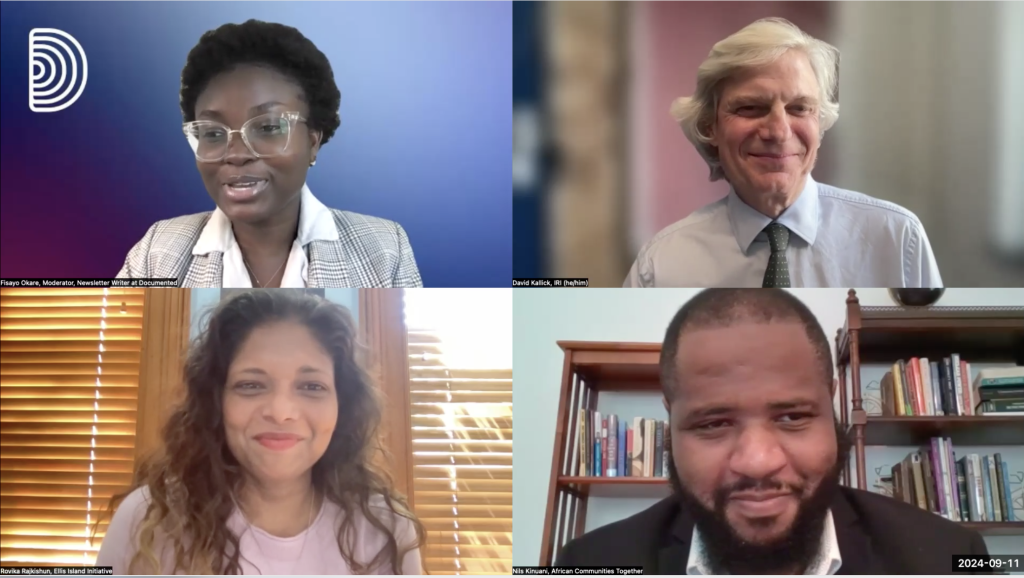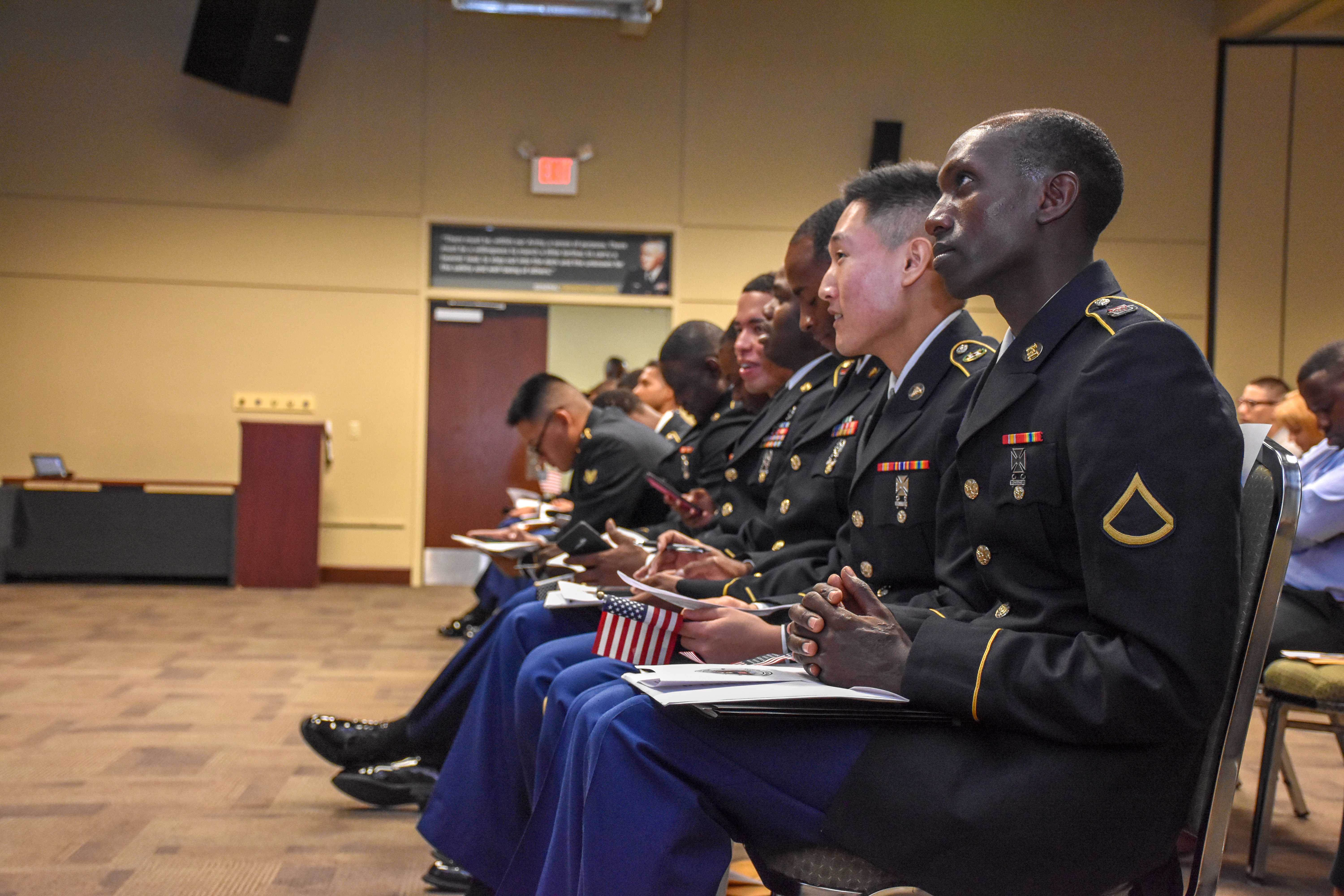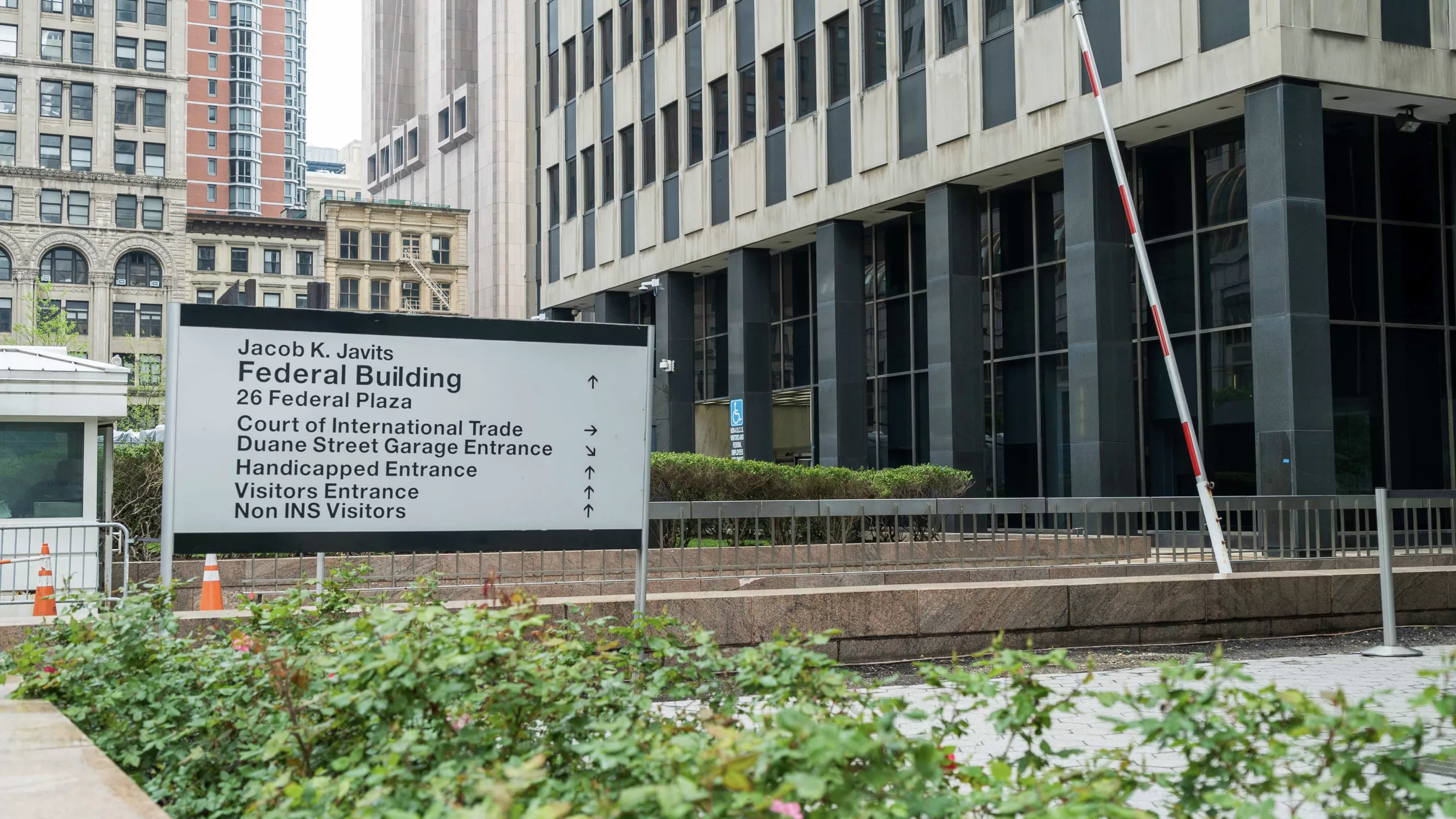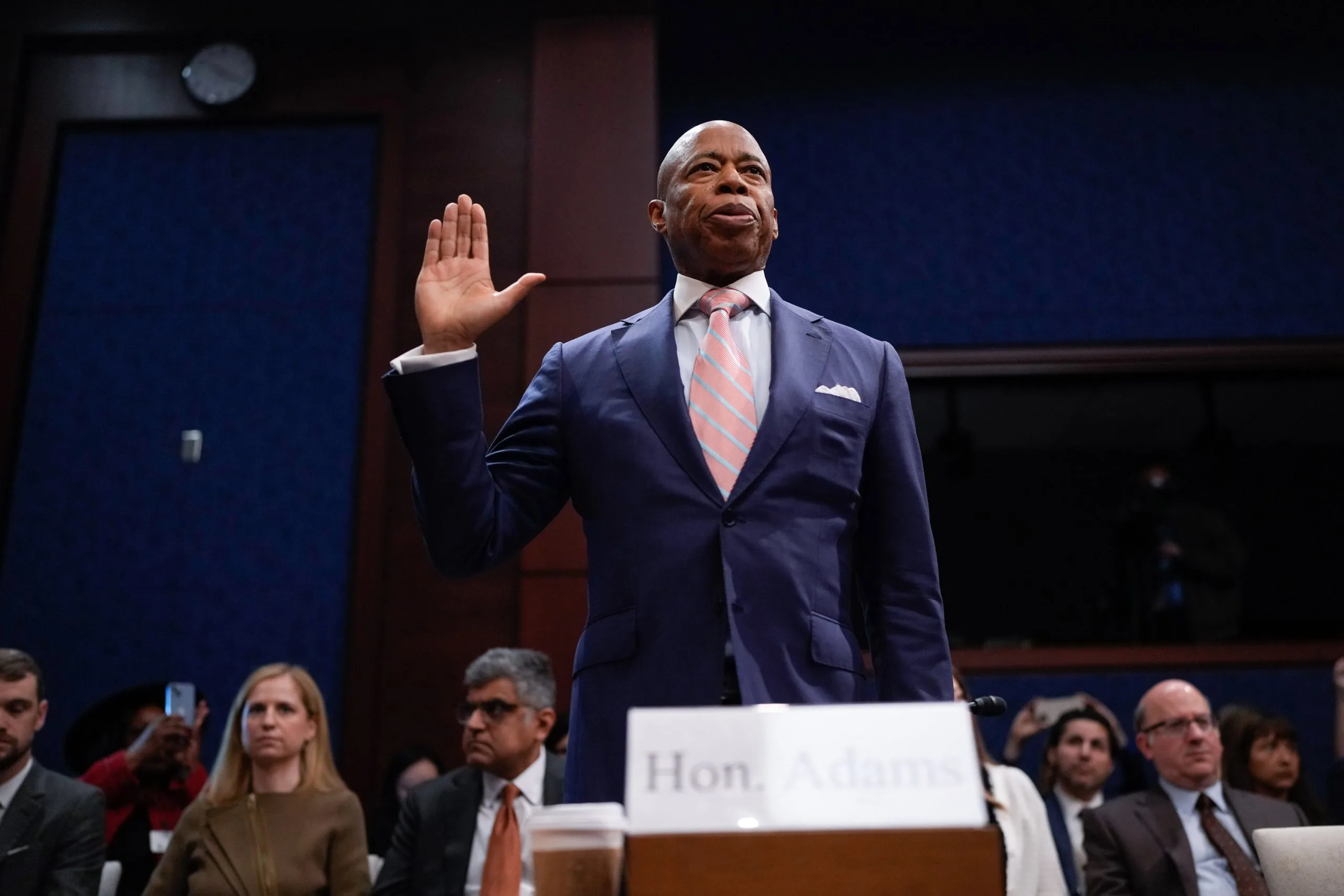Vice President Kamala Harris and former President Donald Trump met face to face for the first time and had their first, and likely the only, presidential debate before the Nov. 5 election.
To no surprise, the issue of immigration – a topic Trump and his Republican allies exploit as a political gambit to try to incite fear and convince voters to vote for their party— was front and center at the debate.
Following the presidential debate, Documented gathered three experts to dissect the claims on immigration shared by the two candidates. Watch the conversation here. Here’s what they had to say:

Participants:
Nils Kinuani: Federal Policy Manager at African Communities Together. Nils brings with him over 8 years of invaluable experience in immigration services and a passion for community leadership. Kinuani started his career as an immigration paralegal and quickly ascended to the role of Government Affairs Manager. Nils also serves as the Immigration Coordinator and Board Director for the Congolese Community of Washington Metropolitan.
Rovika Rajkishun: Partnerships Strategist at the Ellis Island Initiative, a statewide coalition of New York’s leading labor, business, faith and advocacy organizations aiming to transform the state’s approach to integrating migrant families into New York’s communities. To meet this moment, the Ellis Island Initiative has been convening leading voices from across the ideological spectrum to highlight how communities all over New York can benefit from a thoughtful, non-political approach to integrating new immigrants.
David Dyssegaard Kallick: Director of Immigration Research Initiative, and the author of studies, book chapters, and academic papers on the economic and fiscal aspects of immigration at the national, state, metro area, and local level with a particular focus on the regions of New York State. Kallick was previously deputy director and director of immigration research at the Fiscal Policy Institute. He also teaches Urban Economics at the Pratt Institute.
The Congressional Budget Office (CBO) is projecting trillions of dollars in growth in GDP over the next 10 years as a result of new immigrants
Fisayo Okare: David, we’ll start with you. “Millions of people are pouring into our country monthly,” Trump said at the debate. “21 million people … bigger than New York State, pouring in, and just look at what they are doing to our country, they are criminals. … It’s bad for our economy.” David, what’s your response to this data and statement?
David Dyssegaard Kallick: Trump just gets it completely backwards every time. Immigrants are, in fact, good for the economy. Our economy is expanding right now, and our labor force is growing largely because of immigrants. Immigrants’ role in the economy, it’s bigger than most people may expect, and partly because they’re also working in a wider range of jobs than people may realize. Immigrants are home health aides, they’re construction workers, they’re farm workers, but they’re also tech workers and doctors and nurses and accountants and architects and engineers and business owners. In fact, I mean, I kind of thought everybody knew that immigrants were more likely than the rest of us to be business owners, as sort of a natural entrepreneurship among people who have taken the risk of coming here. But immigrants are playing a really important role in businesses in general, and in main street businesses in particular. So I mean, if I could just sum up, I would say the recent immigrant increase is part of the story. People are coming and seeking asylum, and that’s an important challenge, but in the long run, that’s also good for the economy. The Congressional Budget Office (CBO) is projecting trillions of dollars in growth in GDP over the next 10 years as a result, specifically, of these new arriving immigrants, and a trillion dollar practically reduction in the deficit over the same 10 year period. I don’t even know how to talk about the numbers that Trump cites. He makes them up, and they’re really wildly off. He’s just completely upside down about whether it’s good for the economy.
Nils Kinuani: Yeah, that rhetoric is very dangerous. And as David said, that rhetoric is not based on any research, on any statistics or data. That rhetoric only seeks to demonize immigrants, so we find it very baseless.
Rovika Rajkishun: I couldn’t agree with David and Nils more. One of the stats that we could focus on is the fact that there are 500,000 jobs right now in the job market, more than folks looking for employment. So taking someone’s job is really not the issue at all. Filling those open jobs is what we should be focusing on. And immigrants can certainly do that, and our new neighbors can certainly do that.
Also Read: Five Immigration Professionals Dissect Immigration Policies Laid Out at the DNC and RNC
The integration of immigrants into U.S. communities
Okare: Rovika, the most visceral part of Trump’s latest political tactic was on full display during the debate. He made a business claim that immigrants in Springfield, Ohio are eating people’s pets, a claim that the city manager there has said does not exist. What do people need to understand about how immigrants are integrated into our communities, and what role do you feel the media has played in shaping the public’s opinion about immigration policies and immigrants?
Rovika Rajkishun: I was actually hoping you wouldn’t ask me about that because it’s total nonsense and it’s been fact checked. I don’t want to spend too much time on this kind of shameful false rhetoric. My immigrant parents taught me not to lie and then not to continue to lie once facts have been shown to me. And so there is very little I can say about the actual words that Trump talked about last night.
What I can say is I actually watched the debate with my eighth grader who was doing it for his history class, and he was taking notes on it. And so what struck me is that in five years, he’s going to be voting. And so the next generation of voters are paying attention to what our elected officials and those who want to be president of the United States are saying, and they’re very much paying attention to what’s also in the media and what’s being portrayed to them.
Personally, as a formerly undocumented immigrant, part of a very large mixed status family, I am sick and tired of all the news that just focuses on the border and really doesn’t focus on anything else about immigrants.
As part of the Ellis Island initiative, I’ve been traveling across our state, Rochester, Syracuse, Buffalo, we had a convening just yesterday in Buffalo, and what we’re hearing is a very different narrative, one that demonstrates that newcomers are being welcomed. They are filling open positions. They’re helping places where population growth has been an issue, they’re contributing in the form of taxes. And every single place we’ve gone to, we’ve heard employers who are hungry to employ new neighbors. And I think if we looked across the country, that would be the same situation. I want to give you some examples. I have someone in the Hudson Valley, Howard Jarvis, who is a contractor. He’s a Republican, and he doesn’t see this as a political issue. He sees it as an economic issue. He sees it as a common sense issue because he wants to increase his business and grow his business, and if he had more staffing to do that, he could do that, and he sees the opportunity to bring newcomers into the marketplace, to bring newcomers into the workforce.
Similarly, I was in Lake Placid last week, they have unfilled hotel rooms that they just can’t turn over, and so they’re also looking to bring folks in to fill those jobs, and to also increase and benefit our cultural experiences across the state, not just jobs, but also immigrants are an important part of our culture experience in New York state and across this country. And those are the stories that I really think that the media need to spend more time on, and more mainstream media needs to spend more time uplifting those positive messages.
The last thing I would say is that I was struck by how much VP Harris talked about her mother and the struggles of her mother, immigrant struggles, in helping her to get where she is, and if we are looking at what’s happening right now in migration, those mothers who are crossing with their children, they’re looking for the same opportunities. They’re looking for the same dream. And I just believe that here in this great country, that we can do better than we’re doing right now. And I truly believe that. And I’ve been working on immigration for the last eight years, because, as an immigrant myself, I’ve benefited greatly, and I do see down the line how our newest neighbors can really, really help all of our local economy and our localities across the country.
Also Read: How Kamala Harris DNC Speech Confronted Trump Scare Tactics About Immigration
Policy solutions for the next administration
Okare: Nils, Harris listed all that the border security bill would have done if Trump did not urge his allies in Congress to block it. The bipartisan bill has its own flaws, and immigration experts have said, while it does contain solutions, it is not a panacea. What should the next administration be looking to resolve when it comes to federal immigration issues and policies and what stands in the way?
Nils Kinuani: The fundamental issue here is that our immigration system needs to keep pace with the needs of our economy and the needs of our society. As David pointed out, there is a shortage in the high skill labor market, specifically nursing, and even with essential workers, we realized that during the pandemic, right? Immigrants have the talent to fill in those jobs, those positions, and so that’s one thing that the next administration will need to address. But also putting more resources into humanitarian programs. Asylum now has come under attack and then the people fleeing persecution should be able to benefit from the asylum programs and other humanitarian programs, and those reforms can be done through permanent engagement with Congress. To have long term reforms, that administration will need to engage with Congress in a meaningful way.
But also, the administration will need to look at how to remove administrative burdens. For example, we have seen how the processing delays are affecting so many immigrants. Part of that is that the administration keeps putting in place administrative burdens. I’ll give you an example: the work permit application. That application was only one page, and it went from one page to now seven pages for no good reason. The administration will need to see how to remove those administrative burdens to help speed up the immigration applications.
Lastly, the administration can take action to protect immigrants through administrative relief. The administration has authority to extend administrative relief to a number of immigrant communities. For example, my organization, the African communities, together, we are advocating for Temporary Protected Status (TPS). TPS is a humanitarian relief that can be granted by the administration, and there are now so many communities that are in need of that protection. This will be an opportunity where the administration can be proactive in protecting immigrants, in providing the very much needed protection. It’s now unconscionable for the administration to deport people, force people to return to dangerous conditions. We are leading TPS campaigns for the Democratic Republic of the Congo, for the Republic of Mali. And those countries are affected by conflict, natural disasters and we’ve seen the administration continue to deport people to those countries, to those conditions. So the administration will need to take action administratively to protect immigrants and our communities.
David Dyssegaard Kallick: If I could build a little bit on that, I would definitely underscore a big part of US immigration is about humanitarian goals and why we need to be accepting people. Of course, as Nils was rightly saying, it’s also true that there are currently more jobs than there are people looking for jobs. And so that seems like a particularly obvious time. I also would say, though, in the long run, we should understand there’s no fixed number of jobs in the economy. But as more people come, they also become consumers, they also become entrepreneurs, they expand the overall economy. When the population grows, as it always has in the history of the United States, it’s not like there’s a competition for the exact same number of jobs as the population grows, the number of jobs also grows. And so, we happen to be in the unusual position where there’s a large number of unfilled jobs, but even when there aren’t, there’s room for more people to come.
Also Read: At Presidential Debate, Trump Delivers Lies on Immigration. Harris Attacks with Policy Proposal
Questions from the audience for the speakers
Okare: What is the best way to address absolutely outrageous claims? And refocus folks on challenges we share and that would benefit immigrants and folks who are born here?
David Dyssegaard Kallick: I mean, I thought that Kamala Harris’s response was kind of a good one when those ridiculous claims about dogs came up, to say, if you want to know something about this guy’s character, you heard it just now.
Okare: During the debates, Trump kept saying Harris should close the border. And that the current Biden-Harris administration could close it, even without a bill, they could close it. What should people understand about this policy option?
Rovika Rajkishun: I will answer that question. But I also wanted to talk a little bit about legalization, which we haven’t really touched upon, and the number of folks who are in the country who need to benefit from full legalization and not temporary status. I’m talking about the dreamers, I’m talking about folks who’ve lived here for 30 years. I’m talking about asylum seekers now who are coming for us and being processed. We really have to think about how broken the system is. That someone can live their entire lives here from when they were babies. Wee know DACA recipients who came as babies. They were months old, and now they’re in their 30s, and we still haven’t had legalization as an option. Those folks every year, they have to renew their papers, pay the fee to do that, and the fee has increased. So, I think that the candidates need to also address legalization and address it right on.
Then, in terms of the border, this rhetoric is kind of a silly one, because it’s not like there is this border that can open and close. There isn’t a process where we just kind of close the border. There’s no open borders, and there’s no closed borders. So, we need to really dispel all kinds of rumors about border closing, as much as we’re dispelling rumors around all of the lies we heard last night. The question about uplifting and how we change that narrative, we call lies, lies when we see them, and we say it loudly, and we ask the media to also do that.
I’m so glad that those lies were fact checked in the moment last night, and then we also uplift the really positive stories for every one of those lives. There are 10, 20, positive stories of how people are being integrated, how they’re finding jobs, how they’re contributing to their community, and we really need to see more of that in the news, more than anything else.
Nils Kinuani: We definitely can see that former President Trump is not interested in solutions. As I said earlier, his focus is on demonizing immigrants and offering mass deportation as the solution. Mass deportation is not a solution because immigrants, it’s proven, there is data, it’s actually a fact that immigrants are supporting U.S. citizen families, and their family members here, they’re contributing to the economy. So with mass deportation, you are actually hurting the economy. You are actually hurting U.S. families. You are actually hurting communities like ours. We depend on those immigrants to support our communities. So, it’s important here for the audience to note and for the public, for the media to note that deportation, mass deportation, will greatly hurt the economy, will hurt our society, will hurt our communities.
Rovika Rajkishun: Also, it was never addressed, how would they do mass deportation? Would they knock on all of our doors and ask for our papers? Is that the America we’re going to live in where every person has to walk around with some sort of paper to demonstrate that they are somehow a citizen or a green card holder or have some other status that allows them to be here? The idea of mass deportation is also a ridiculous idea.
Okare: On this campaign trail, immigrant communities have been the recipients of everything that has been said. You are a part of the immigrant communities too. Are you seeing communities that you work with or work to respond in a certain way to the rhetoric and lies targeted at them?
Nils Kinuani: To a certain extent, the rhetoric is causing fear in our communities. But we are fighting. We are mobilizing. We had a rally a few weeks ago in D.C. with our communities to push for immigrant rights protection that our members need. So, although this rhetoric is causing fear in our communities, it’s not holding us back. We are continuing to fight and to mobilize our communities, and we think that if we can work together, our cause will prevail.
Rovika Rajkishun: I also think that we should recognize that the immigrant community is not a monolithic community. It’s not like we are one voting block, or we all think the same way, and we all agree on the same issues. And so the same work we have to put in to fight back against lies, fight back against this kind of toxic rhetoric, this demonization of people who are coming here, our new neighbors, or other immigrants or undocumented immigrants. It’s the same work that needs to be done in our own immigrant communities, because we’re not just all the same people who think the same way. And I think we have to really, really recognize that also.
Okare: What strategies can the everyday person use to elevate nuanced and authentic discourse about the immigrant experience? This was another question from the audience. And additionally, how can we engage individuals outside the immigration space and traditional support networks to challenge and counteract immigration related forces?
Rovika Rajkishun: Fisayo, I feel like that is a great plug for Documented — everyone subscribing to your newsletter and getting news that’s specific to immigrant communities and all of the different stories that you all carry, so I’ll just leave it there.
Okare: You heard what she said. Subscribe: www.docu.nyc/earlyarrival. Can someone speak to the specificities of the bill that was supposedly halted, by former President Donald Trump? This is the bipartisan border security bill that they are referring to. How would that bill affect immigrant communities?
Nils Kinuani: Very quickly I will mention that the bill was intended to provide more resources to border security. Vice President Harris alluded to that last night, that the bill was intended to put more resources, and those resources are needed, and we can just turn away people seeking protection and safety. Offering protection, safety, is within our DNA, as an American society. So we cannot undermine those fundamental rights and values of our society. So definitely, we need more resources on a long term basis, and that’s what this bill was intended to do.
Okare: This, I think, is a question from a nonprofit group or an advocate, but what are your thoughts on how and when to prioritize our work on defeating Trump and two, pushing a Harris administration and the current Biden administration to put forth policies that reflect the values that we’re discussing here?
Rovika Rajkishun: I think our first priority needs to be defeating Trump, and that does not mean that we let VP Harris off the hook. But I cannot imagine another Trump presidency, and the work of advocates, including myself, has always been to push and to continue to push and continue to hold our elected officials accountable. If I had to prioritize it, it would be there’s absolutely no way that we can have another Trump presidency. At least, I know that we can work with VP Harris. We cannot work with Trump in the White House, not only for immigration, but for many of the other issues that we care about, including our democracy.
Okare: David, I’ll throw this question to you, particularly as regards to jobs. This person says the Democrats also haven’t helped immigration over the years. There’s still no part-time residency for foreign students or foreign workers.
David Dyssegaard Kallick: That’s a big question to answer in two minutes. I would say a really important part of it is that the President can only do so much really. We need to have Congress as well. And I think the congressional races are just as important in that respect. I think what we’ve seen is presidents straining, in some ways, from both parties to try to do as much as they can without Congress, with the Republicans in Congress absolutely unwilling to move even something as close to what they would write themselves — as this border bill that we just saw. So I would say it has to be a real discussion in Congress, and there will be compromises and things that need to be worked out, but it needs to be people sitting down and actually serious about trying to solve the problem. What we saw last night was another version of President Trump not really serious about solving the problem, but looking to inflame the fires of people’s imagination and not be serious about trying to do anything, even if we might disagree about what we would do. It doesn’t look to me like he’s remotely serious about trying to do anything.















